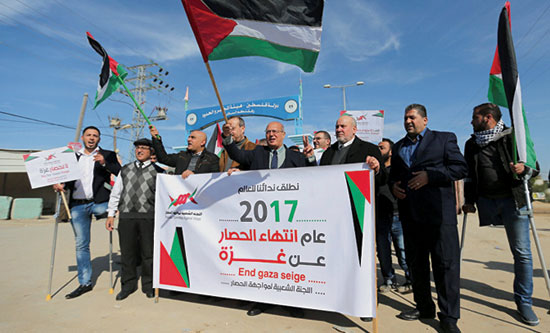
Palestinians demonstrate against the Israeli Egyptian blockade on 30 January 2017
Negotiations have taken place in Cairo over the summer between Hamas representatives and Al Sisi’s government – and separately between Mahmoud Abbas’ Palestinian Authority (PA) and Egypt. Hamas has been opposed by an Egyptian regime which has increased security collaboration with the Israeli military. Despite widespread protest, the PA has also continued its collusion with the Israeli occupation. With Israel emboldened by Trump’s gestures of support, the pressure on Hamas has been augmented by its regional isolation, deserted by former allies Turkey and Qatar. Egypt has been key to tightening a blockade which has meant that the Rafah border has been opened for fewer than seven, non-consecutive, days over the last eight months. Aside from a very small group of pilgrims going to Umra at the end of August and a couple of tanker loads of Egyptian oil, Hamas spokesmen have been among the few people to leave or enter Gaza since March this year.
The talks have been brokered by Mohammad Dahlan, a millionaire and ex-Fatah politician who split with Abbas around 2002. Dahlan is based in the UAE and is acting as a broker or advisor to the Gulf royals and, importantly, to Al Sisi. He also appeared via video link to the Gaza parliament but has so far brushed aside questions of whether he will return; his supporters act as a political party (his faction has seven MPs in the West Bank) and have organised street mobilisations praising his efforts. The announcement by the Hamas government in Gaza that it will now step down in favour of elections has boosted Dahlan’s Fatah faction. His Gaza spokesman Imad Mohsen claimed that: ‘today, Hamas has recognized that Dahlan is a powerful man in the region’. For Egypt, a vicious enemy of the Gaza government, this process is about building its own regional influence. Despite Abbas’s continuous concessions and security collaboration, Israel and its allies may see Dahlan as a more reliable ally for holding back Palestinian resistance.
Palestinians in Gaza, meanwhile, continue to face an intense social crisis from the Israeli-Egyptian blockade. Speaking in June, Robert Piper, UN humanitarian coordinator for the Palestinian territories, described ‘a total collapse of basic services, including critical functions in the health, water and sanitation sectors… An extraordinarily inhuman and unjust process of strangling gradually two million civilians in Gaza’. Piper’s report found that:
- 42% are unemployed, with youth unemployment over 60%.
- Over a million Palestinians in Gaza are suffering moderate to severe food insecurity, despite UN food aid.
- 17 years ago, 98% of Palestinians in Gaza had safe drinking water; by 2014 it had fallen to 10.5% and it is even lower today.
- Israel has prevented the implementation of a sewage treatment plant in northern Gaza. Even if it were implemented, other plants would be needed to cope with the demand.
Egypt has maintained tight control of the Rafah border crossing since the beginning of the Al Sisi dictatorship in July 2013. 20,000 are now estimated to be in need of medical attention outside Gaza. 90% of cancer medicines have run out. In September researcher Abdul Nasser Farwana reported that Israeli officials were blackmailing Palestinians at the Erez crossing, and have arrested at least 60 civilians, including patients, students and relief workers.
Hamas is now in a very weak position. The Israeli-Egyptian blockade is not the only reason for this.
The Hamas government in Gaza has become increasingly unpopular, particularly among young people and women, who are forced to wear the hijab and face conservative threats in many areas of social life; they also bear the brunt of mass unemployment. Abbas and the PA are even more unpopular, plunging to new depths this year when they acted as hired hands in the murder of activist Basel Al Araj, and later for blocking payments for Gaza Strip electricity generation. No election will resolve the crisis of representation faced by the Palestinian masses. The occupation and its supporters must be opposed on the streets.
Louis Brehony
Fight Racism! Fight Imperialism! 260 October/November 2017




